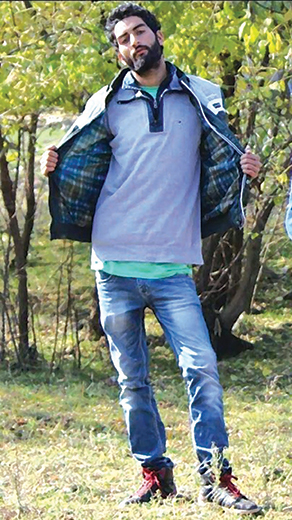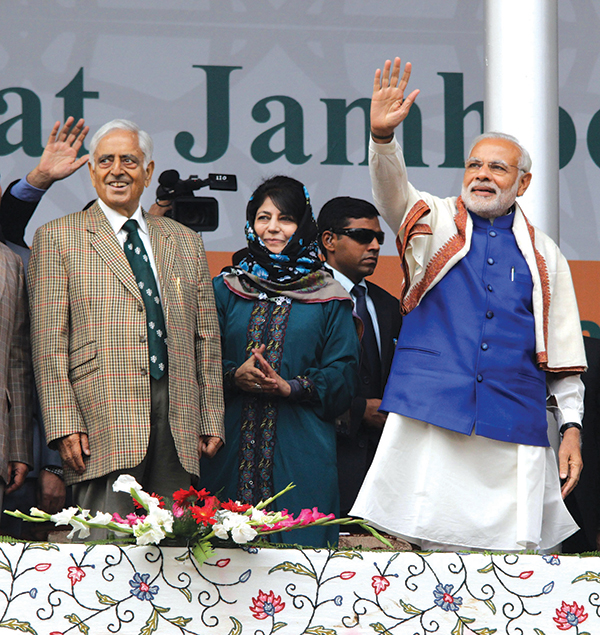Hopes that Prime Minister Narendra Modi will land in Srinagar and revive the moribund processes ailing Kashmir proved a hoax. Hosts are frustrated and unable to make out if their efforts to manage an impressive crowd was a worth the gamble, R S Gull reports
A day after Modi’s visit, Mehbooba Mufti, PDP president and Chief Minister-hopeful had an unpleasant date. Amid curfew-like situation, she drove to SKIMS and met a few boys who were injured in police action. Later, she went to SMHS to see her party workers who were injured in stone pelting when being driven to hear Prime Minister Narendra Modi on November 7.
PDP’s north Kashmir leaders were literally on a police officer’s head for most of the day asking him to prevent attacks on their workers in city periphery. Curbs on ‘Million March’ had triggered anger and when hoards of men and women were driven to Srinagar to hear Modi, it awkwardly impacted situation at many places. This was despite most of the city was under curfew, separatists were restricted and massive deployments with tons of concertina wiring dominating the roads. Somehow it went off almost incident free and when everybody was cooling heels in the evening, Gowhar Dar, an engineering student at the Srinagar School of Management (SSM) was declared brought dead by SKIMS.
The ‘fresh blood’ prevented the high-profile visit from becoming just an event. Expected for a long time to revive the ‘Vajpayee Moment’, the visit ended with blood, coffin, burial and a protest, paving way for a relook on its impact.
PDP’s expectations were modest. Knowing invoking Self Rule would be ‘inflated statesmanship’, PDP hoped the visiting Premier would pick-up threads from where Vajpayee had left. Internally, PDP was under the impression that repeated cancellations of talks with Pakistan might finally have a solution with Modi, copying Vajpayee, extending his hand of friendship to Nawaz Sharief from Srinagar. PDP veterans talked about that ‘Vajpayee Moment’.
PDP has significantly invested through backroom channels to somehow get the hitherto closed window reopened for the Kashmiri separatists to sustain its ‘battle of ideas’ on ground. When Chief Minister Mufti Sayeed had a long-awaited meeting with Modi in October, these two issues were at the core of interaction. Later, when Ram Madhav, the Sangh point-man, had a detailed dinner meeting with Mufti in anticipation of the visit, the same issues figured.
Mufti’s speech before an impressive audience (comprising primarily of nearly 24000 PDP supporters plus others) in the S K Stadium was his wish list. Convincingly, he listed everything he thought was vital for J&K’s stability: bridging the regional gulf to pave way for brining J&K closer to Delhi, inevitability of talking with neighbours, engaging the Kashmiri people sitting on the other side of the ideological dichotomy and avoiding Israel-type settlements for Pandit migrants.
As Chief Executive of India’s only major Muslim majority state, Mufti found his responsibility to talk about the rising levels of intolerance on Indian streets. It was expression of the long-stated PDP thought process that in India, Kashmir offers the only natural stage for any right-winger to jump the Lakshman Rekha and address India’s minorities. In anticipation of the visit, PDP parliamentarian Muzaffar Hussain Beg had written an open letter to Modi suggesting containing intolerance.
But it did not happen. Modi skipped responding to everything that Mufti highlighted. Driven by his undiluted Sab Ka Saath, Sab Ka Vikas, Modi talked about development and prosperity. He asserted his commitment to the Vajpayee’s key Kashmir ‘ideation triangle’, the Insaniyat (humanity), Kashmiriyat and Jumhuriyat (democracy) only to appreciate Muftis efforts to hold local body polls. He, in fact, reacted by insisting that he does not require any advice on Kashmir. For more than half an hour, he detailed his attachment and concern to Kashmir, listed his earlier endeavours and eventually relieved his host government by announcing the Rs 80,000 crore ‘package’.

Politically, the speech was a non-starter. “It could have been a good beginning but a good opportunity was wasted,” Omar Abdullah, NC president and Mufti’s predecessor, said. “Vajpayee’s legacy was buried.” Mufti, however, believes it was Modi’s prerogative to whether to touch any subject or not. “I’m not a dictator who will dictate all things to him,” Mufti said. He, however, insisted reconciliation with Pakistan was discussed with Modi in anticipation.
But the Rs 80,000 crore announcement saved the day, both for the host government and the people it assembled. A police officer deployed in the stadium said, at one point of time, he felt that if the Prime Minister did not announce the package, there might be law and order issues in the stadium itself. “People had been assembled just with that promise,” the officer said.
Packages from the union government follow a script that suits Delhi. The series of packages between H D Devi Gowda days to Dr Manmohan Singh’s Prime Minister’s Reconstruction Plan (PMRP) have followed a pattern and Modi package was not different. While these packages take into account the state’s pressing requirements, by and large, it is the central priority that dominates. Even with those priorities, state is still a beneficiary.
In the package, that Finance Minister Dr Haseeb Drabu has branded as TAMEIR (The Aggregative Macro Economic & Infrastructure Rebuilding Plan), the key mass concern was about flood rehabilitation. Though 14 months eclipsed since September 2014 devastating floods, the governments in Delhi and Srinagar have dithered in making a formal statement about what it intends to do. Barring Rs 1500 crore World Bank grant for social infrastructure, the relief and rehabilitation continues to be an ad-hoc system.
Apart from slightly more than Rs 2000 crore of insurance claims released by the insurers, Delhi has released around Rs 5000 crore post-floods for restoration and reconstruction. Of this Rs 1321 crore has gone to the affected directly for reconstruction. Rest has either gone to the relief or to the restoration of the public infrastructure.
While TAMEIR has set aside Rs 7854 crore for flood relief, reconstruction and flood management, it envisages barely Rs 1200 crore that will go to the damaged houses. For trade, Rs 800 crore is listed which includes interest subvention.
As per the details of the 25 projects – making almost half of the overall package – which are being implemented in the next five years, details of which Chief Minister Mufti Sayeed revealed on Friday in Jammu, Kashmir apparently does not figure in BJP priorities. Insiders suggest there were certain last moment changes in the negotiated plan which shuffled the projects though not the overall resource involved.
But political pundits do not see the visit entirely unproductive. The crowd that impressed Modi has led to his instant acknowledgement that government is functional at ground zero. For coalition governments, this acknowledgement is virtual aphrodisiac. It will help the two parties get cozy in coming days for symbiotic interest regardless of the costs involved for them in the long run.
While PDP managed such a huge crowd, even bigger than the one that came to hear Vajpayee in 2003, in a situation of rising intolerance, it still exhibited the chinks in its ranks. Two of its three MPs – Muzaffar Hussain Beg and Tariq Hameed Karra stayed away. Modi in fact mentioned Beg’s name in his address suggesting PDP had invited him but he did not oblige. Karra, even termed Gowhar’s killing “a gift from Modi”, adding to his party’s embarrassment.
The crowd also vindicated PDP on two fronts. Firstly, its reported erosion at ground zero, because of allying with aggressive right-wing party, is not at a scale as newspaper headlines suggest. Its activists felt mobilized even in trying situation when Kashmir’s entire separatist leadership was immobilized and hundreds were rounded up to stall million march.
Secondly, the rally will help BJP understand the importance of Mehbooba Mufti in the given situation. That importance will help her replace her father faster than thought earlier.


